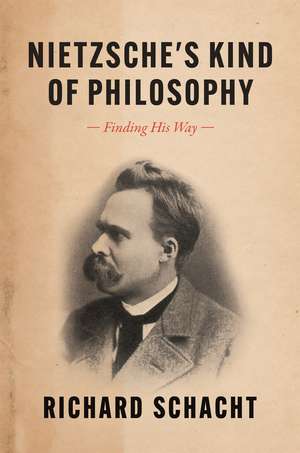Nietzsche's Kind of Philosophy: Finding His Way
Autor Richard Schachten Limba Engleză Hardback – 2 mai 2023
In Nietzsche’s Kind of Philosophy, Richard Schacht provides a holistic interpretation of Friedrich Nietzsche’s distinctive thinking, developed over decades of engagement with the philosopher’s work. For Schacht, Nietzsche’s overarching project is to envision a “philosophy of the future” attuned to new challenges facing Western humanity after the “death of God,” when monotheism no longer anchors our understanding of ourselves and our world. Schacht traces the developmental arc of Nietzsche’s philosophical efforts across Human, All Too Human, Daybreak, Joyful Knowing (The Gay Science), Thus Spoke Zarathustra, Beyond Good and Evil, and On the Genealogy of Morality. He then shows how familiar labels for Nietzsche—nihilist, existentialist, individualist, free spirit, and naturalist—prove insufficient individually but fruitful if refined and taken together. The result is an expansive account of Nietzsche’s kind of philosophy.
Preț: 336.11 lei
Nou
Puncte Express: 504
Preț estimativ în valută:
64.32€ • 66.45$ • 53.53£
64.32€ • 66.45$ • 53.53£
Carte disponibilă
Livrare economică 04-18 martie
Livrare express 15-21 februarie pentru 43.91 lei
Preluare comenzi: 021 569.72.76
Specificații
ISBN-13: 9780226822853
ISBN-10: 0226822850
Pagini: 400
Dimensiuni: 152 x 229 x 28 mm
Greutate: 0.65 kg
Ediția:First Edition
Editura: University of Chicago Press
Colecția University of Chicago Press
ISBN-10: 0226822850
Pagini: 400
Dimensiuni: 152 x 229 x 28 mm
Greutate: 0.65 kg
Ediția:First Edition
Editura: University of Chicago Press
Colecția University of Chicago Press
Notă biografică
Richard Schacht is professor emeritus at the University of Illinois at Urbana-Champaign. He is the author and editor of numerous other books relating to European philosophy after Kant.
Cuprins
Preface
Reference Key
Introduction
Prologue
1 Toward Understanding Nietzsche
Part I Nietzsche Becoming Nietzsche
2 The Nietzsche of Human, All Too Human
Addendum: The Nietzsche of Daybreak
3 The Nietzsche of Joyful Inquiry I–IV
4 The Nietzsche of Thus Spoke Zarathustra
5 The Nietzsche of Beyond Good and Evil
Addendum: The Nietzsche of Joyful Inquiry V
6 The Nietzsche of On the Genealogy of Morality
Addendum: The Nietzsche of 1888
Part II Nietzsche Becoming—What?
7 Nietzsche as Nihilist?
8 Nietzsche as Existentialist?
9 Nietzsche as Individualist?
10 Nietzsche as “Free Spirit”?
11 Nietzsche as Naturalist?
Backstory and Acknowledgments
Notes
Bibliography of Related Nietzsche Studies
Index
Reference Key
Introduction
Prologue
1 Toward Understanding Nietzsche
Part I Nietzsche Becoming Nietzsche
2 The Nietzsche of Human, All Too Human
Addendum: The Nietzsche of Daybreak
3 The Nietzsche of Joyful Inquiry I–IV
4 The Nietzsche of Thus Spoke Zarathustra
5 The Nietzsche of Beyond Good and Evil
Addendum: The Nietzsche of Joyful Inquiry V
6 The Nietzsche of On the Genealogy of Morality
Addendum: The Nietzsche of 1888
Part II Nietzsche Becoming—What?
7 Nietzsche as Nihilist?
8 Nietzsche as Existentialist?
9 Nietzsche as Individualist?
10 Nietzsche as “Free Spirit”?
11 Nietzsche as Naturalist?
Backstory and Acknowledgments
Notes
Bibliography of Related Nietzsche Studies
Index
Recenzii
"Schacht provides a 'large-scale reconsideration' of Nietzsche’s work that emphasizes the need to examine the philosopher’s assertions in the context of his entire corpus to understand the ways in which his thinking evolved. Doing so, the author contends, reveals that Nietzsche’s reputation as a nihilist is overblown . . . [and that] Nietzsche wasn’t an individualist . . . Scholars will find this an evenhanded . . . take on Nietzsche."
“A fully realized work from a philosopher operating at peak power.”
“Nietzsche is notoriously hard to situate on the philosophical map, given his stylistic variety and nonsystematic aspirations. Schacht argues that various labels commonly applied to the German philosopher are only apt to a point. Examining a range of Nietzsche’s writings, Schacht shows how each work contributes to the philosopher’s broad project of interpreting human beings as natural creatures capable of developing more than ‘merely natural’ capacities. This accessible but interpretively rich book will help general readers find their way when reading Nietzsche while also engaging the interest of scholars.”
“Schacht’s latest book is one of a kind. With unparalleled insight, he offers a comprehensive, sharp-sighted, and scrupulously honest rendering of Nietzsche’s main concerns, but above all an illuminating investigation into the primary, determining questions: What exactly is the purpose of philosophy, according to Nietzsche? How did he radically transform the discipline? And why did he have to? A priceless book which provides a lucid understanding of Nietzsche’s specific stance and logic.”
